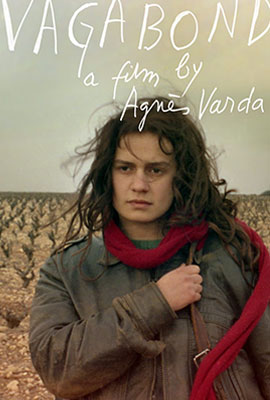
(1985)
directed by Agnes Varda
“Vagabond” is Agnes Varda’s masterpiece. The French title of the movie is “Sans Toit Ni Loi” which translates as “Without Roof Nor Law.” Sandrine Bonnaire plays Mona, a young homeless woman who drifts along highways and sleeps in fields.
At the beginning of the movie, Mona’s dead body is discovered by a farm worker. The opening shot moves slowly across a desolate winter landscape. As the camera moves closer, we see the frozen body of a young woman at the bottom of a ditch. Soon, the police arrive at the scene and begin interviewing witnesses. Mona’s story is told indirectly through a series of interviews with the people she met along the way. The story, though fictionalized, is told in the style of a documentary.
“Vagabond” is shocking because the protagonist is a beautiful, young woman. The film is an important feminist work because the film serves to dispel male illusions concerning the female body. Watch for the moment in the film when Mona is eating a can of sardines and wipes oily smudges across her face. This is a young woman who simply doesn’t care how she looks or smells. Mona is seductive, rebellious, and uncaring. She says “Je m’en fous, je bouge.” (“I don’t care, I move on.”)
One of the most moving moments in “Vagabond” occurs when Mona’s defenses finally fall. As each day passes, she sinks ever lower. The life of the vagabond slowly unravels to become the life of the outcast. At the end of her journey, Mona is completely overwhelmed and begins crying. At that moment, we can see how defenseless she really is. Mona is an incredibly strong and stubborn young woman. I am sure most of us would have broken long before.
Varda offers no final word. It feels as if you are the last witness to be interviewed. You are forced to draw your own conclusions based on your encounter with Mona in this haunting film. This extraordinary film forces us to reassess our lives regarding freedom, responsibility, and community.